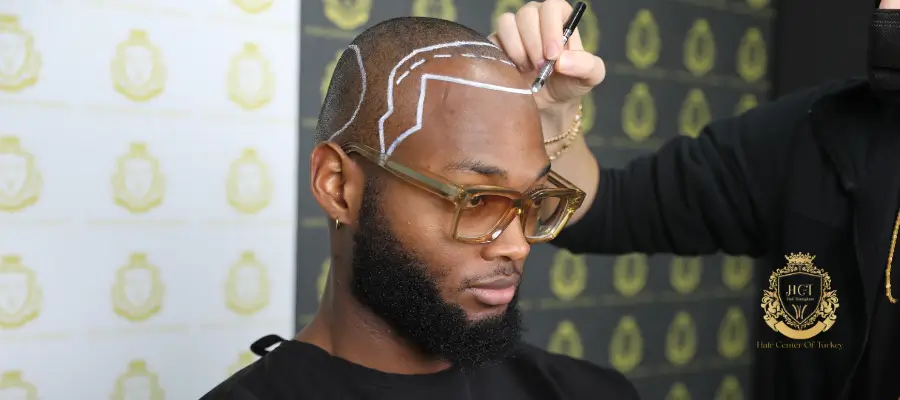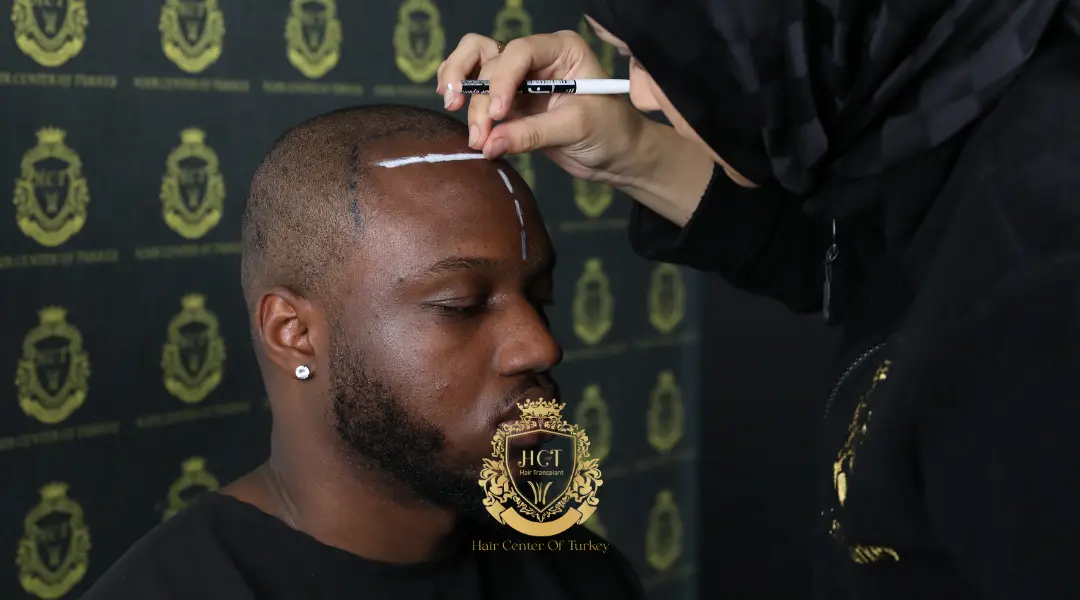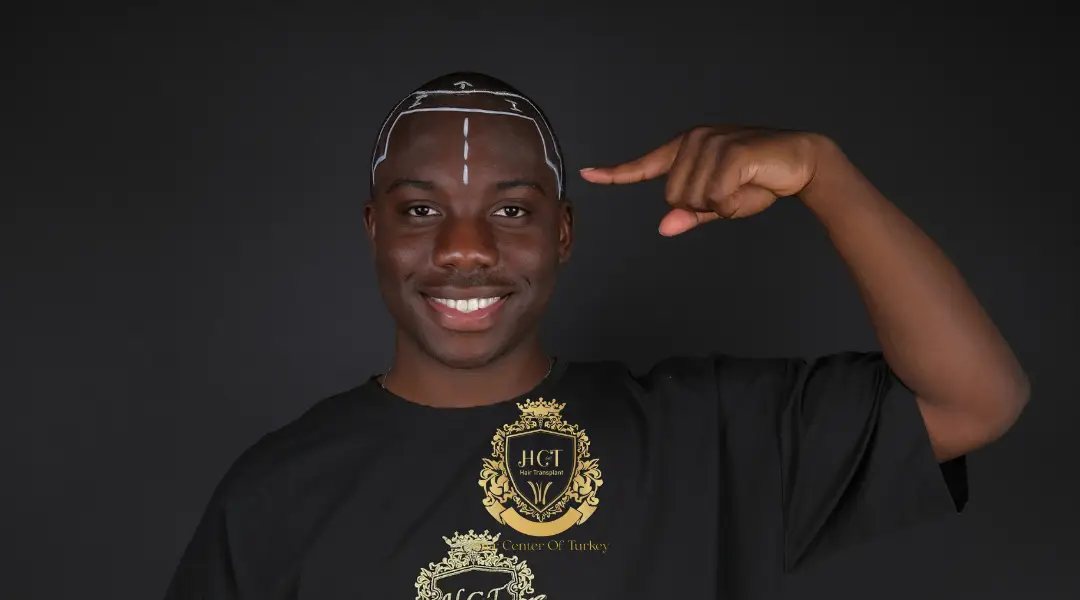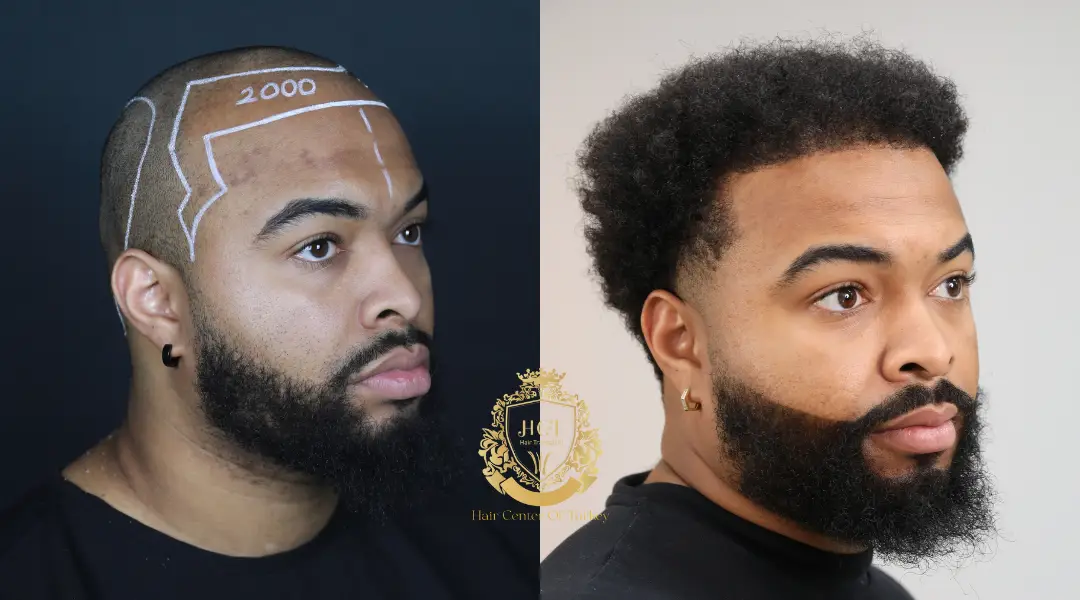
Afro Hair Transplant Turkey: What Is It?
Afro hair transplant uses special techniques to handle naturally curly and coarse hair follicles. This procedure adapts standard hair restoration methods to the uniquestructure of Afro-textured hair.
They take follicles and place them at angles that follow the natural growth pattern. This reduces the risk of kinked grafts or unnatural results. Surgeons typically place grafts carefully to allow curls to grow in their natural direction. The goal is full-looking density while preserving curl tightness and scalp health.

Table of Contents
Why Choose Turkey for Afro Hair Transplant?
Turkey offers world-class clinics, experienced surgeons, and cost-effective packages compared to Western countries. Top clinics in Istanbul, Antalya, and other cities combine international standards with affordable pricing. Many offer packages that include hotel, transport, and translation services ideal for international patients.
Surgeons often use advanced grafting techniques suited for textured hair. The supportive infrastructure and skilled staff make Turkey a popular and reliable choice for Afro hair transplant patients worldwide.
Why Is Afro Hair Transplantation More Difficult?
The biggest challenge in afro/kinky-curly hair is that the follicle often travels in a curved path under the skin.
Because of this anatomy, using standard tools and angles can increase graft cutting (transection) and reduce graft survival. The literature also emphasizes that FUE in afro-textured hair often requires specific technical adjustments.

- Curved follicle pathway: If the punch does not follow the follicle’s curve, grafts can be cut (higher transection risk).
- More difficult donor assessment: Curly hair can visually “mask” true density, which may lead to inaccurate graft-target planning.
- Angle and depth sensitivity: Incision angle and depth influence curl direction; incorrect angles can cause messy growth or an unnatural look.
- Higher tendency for folliculitis and ingrown hairs: The curly shaft structure may increase folliculitis/ingrown hair risk in some patients, so early aftercare and follow-up matter.
- Scar visibility and keloid tendency: Some skin types may have a higher keloid risk, and FUE micro-scars can appear hypopigmented. Keloids are rare in hair transplantation, but they have been more commonly associated with strip surgery (FUT).
Differences Between Afro Hair and Straight Hair in Transplants

Afro hair transplant differs significantly from straight‑hair transplant because:
- Curly follicles grow at sharper angles, requiring careful extraction to avoid damage or graft twist.
- Curly hair tends to be coarser and denser, which can affect graft placement density and spacing.
- Using standard straight-hair methods raises the risk of death or failure for curled grafts. Thus, expert attention is crucial.
Because of these differences, surgeons must adjust donor harvesting, graft slits, and implantation angles. This ensures healthy survival and a natural curl appearance after growth.
Afro Hair Types

Choosing the Right Clinic for Afro Hair Transplant
Choosing the right clinic for an Afro hair transplant is crucial for achieving natural-looking, lasting results. Not all clinics have experience with the unique structure of Afro-textured hair, so area of expertise matters.
Find clinics that show good results in Afro hair restoration. Make sure they have surgeons skilled in working with tightly curled hair. Prioritize facilities that offer detailed consultations, multilingual support, and transparent before-and-after portfolios.
Patient reviews and international certifications are also key indicators of quality. A good clinic will tailor the procedure to fit your hair pattern, scalp condition, and growth goals. This helps ensure better graft survival and natural curl alignment.
FUE or FUT: Which Technique Is Preferred for Afro Hair?
In practice, most centers prefer a modified FUE approach (manual or micromotor, with appropriate punch design) for afro hair transplantation.
This is mainly because FUT (strip) leaves a linear scar on the back of the scalp and may increase hypertrophic scarring/keloid risk in some patients. However, in carefully selected cases—patients who need a very high number of grafts, have no keloid history, and accept a linear scar—FUT can be considered when performed by an experienced team with microscopic dissection.
Hair Center of Turkey approach
- In most afro cases: Afro-specific FUE (optimized punch angle for curved follicles, with a goal of lowering transection).
- In selected cases:If graft needs are very high and the patient accepts a linear scar, FUT may be evaluated.
Hair Center of Turkey Principles for Afro Hair Transplantation
- A team with proven experience and a strong case portfolio in afro/curly hair.
- Punch selection and angulation that respects follicle curvature, aiming to reduce transection.
- Incision planning and hairline design that preserve the natural curl direction.
- More conservative planning and closer follow-up in patients with keloid/scar tendencies.
A structured aftercare protocol and check-up plan to address folliculitis/ingrown hair during healing.
How to Prepare for an Afro Hair Restoration in Turkey
- Stop smoking and limit alcohol two weeks before the appointment to boost healing.
- Use any pre‑surgery hair treatments your clinic recommends and avoid strong chemicals.
- Arrange travel and hotel reservations at least 2–3 days before surgery to allow acclimation.
A clean scalp, a healthy donor area, and proper rest help ensure graft survival and smooth healing. Planning in advance reduces stress and boosts your overall results.
Afro Hair Transplant Procedure Step by Step
The surgeon first extracts healthy follicles from donor sites using FUE or DHI methods. Next, the technician makes small cuts in the area where the hair will go. These cuts complement your hair’s natural curl.
The team carefully places the grafts. They make sure to get the right depth and angle to look natural. A healthcare provider applies a protective dressing and gives you detailed aftercare instructions. The entire process usually takes 4–8 hours depending on graft count and treatment complexity.
Can You Get a Hair Transplant with Afro Hair?
Yes, people with Afro hair can successfully get hair transplants using techniques adapted to curly hair structures. Afro hair needs special care because of its curved follicles and unique scalp angle.
However, skilled surgeons can achieve great results. Methods like FUE (Follicular Unit Extraction) and DHI (Direct Hair Implantation) help prevent damage. They do this during the extraction and implantation processes.
Choosing a clinic experienced with textured hair is essential for achieving natural growth patterns and high graft survival. Many patients with Afro hair see impressive transformations within 6–12 months post-transplant.

Recovery Time and Aftercare for Afro Hair Transplant
The first two weeks focus on gentle cleaning and avoiding pressure or friction on grafts. Keep your scalp clean, avoid intense sun or sweat, and sleep in a raised position if advised. Mild scabbing is normal and typically resolves within 7–14 days. You should avoid heavy exercise, tight hats, or scratching for at least three weeks.
After one month, grafts settle; new growth often starts around three to four months post procedure. Proper aftercare ensures healthy hair growth and reduces the risk of complications.
Success Rate of Afro Hair Transplants in Turkey
Success rates for these transplants in Turkey generally range between 85% and 95% when performed by experienced surgeons. Clinics specializing in textured hair achieve higher graft survival and a natural curl look. Success depends on surgeon skill, graft handling, and aftercare compliance.
Regular follow-ups and the patient’s health habits (hydration, nutrition, and avoiding smoking) also influence long‑term outcomes. Most patients report satisfying results and improved hair density within 6–12 months post‑treatment.
Afro Hair Transplant Before and After Results
Patients often see visible density improvement and natural curls returning within six to twelve months. Photos before and after typically show fuller hairlines, even coverage, and curls growing properly in their original direction.
Many clients report boosted confidence, easier styling, and a more balanced scalp appearance. Success depends on correct graft placement, survival, and patient adherence to aftercare instructions. Realistic expectations and patience help maximize satisfaction with final results.

Afro Hair Transplant Turkey Cost 2026
Afro hair transplant Turkey cost in 2026 ranges between €2,500 and €6,000 depending on graft number and clinic expertise.
Afro hair transplant procedures require specialized experience due to the unique curl pattern of hair follicles. Surgeons must carefully extract and implant curved grafts to prevent damage. The total cost depends on the number of grafts and the technique used.
Frequently Asked Questions
How is an Afro hair transplant different from a regular hair transplant?
Afro hair features a unique curl and root angle. It requires special extraction and implantation techniques. Surgeons must handle follicles carefully to avoid damage. Results look natural when done by trained experts.
Is the FUE technique suitable for Afro hair?
Doctors can use FUE to treat Afro-textured hair. Skilled surgeons use modified tools for curved follicles. Precision is key to avoid cutting the hair grafts. Many Turkish clinics offer Afro-specific FUE hair transplant methods.
What is the timeframe for observing results from an Afro hair transplant?
New growth starts around 3–4 months post-surgery. Full results will appear in 12 to 18 months. Afro hair grows slower but fills in densely. Consistent aftercare improves the outcome.
Is an Afro hair transplant a permanent procedure?
Yes, transplanted hair is permanent and resistant to baldness. Good scalp care and healthy habits will ensure long-lasting results. Proper technique ensures long-term success. Regular follow-ups may help track progress.




